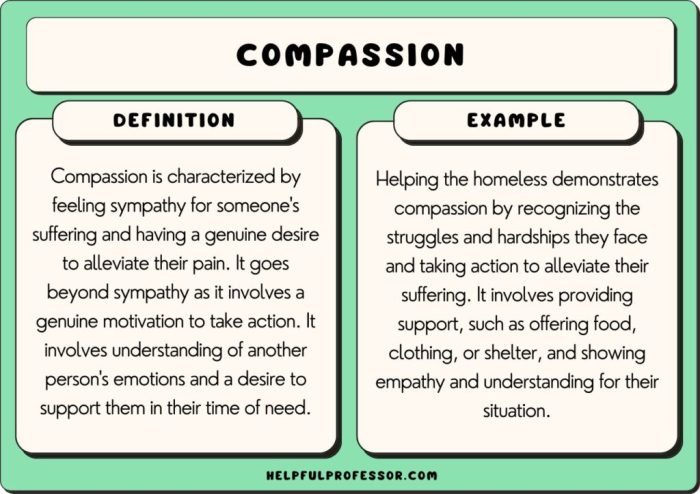Demonstrating conviction courage compassion and care for the community can – Demonstrating conviction, courage, compassion, and care for the community can lay the foundation for thriving and resilient communities. These values are essential for fostering a sense of purpose, direction, and progress within communities. This article will explore the significance of each of these values and provide practical examples of how they can be cultivated and practiced within community settings.
Conviction provides a strong foundation for community engagement, guiding individuals to act with purpose and determination. Courage empowers individuals to step outside their comfort zones and advocate for positive change. Compassion fosters empathy and understanding, creating a welcoming and inclusive environment.
Care builds strong bonds and a sense of belonging, nurturing the well-being of all community members.
Demonstrating Conviction
Conviction is a cornerstone of meaningful community engagement. It represents a deep-seated belief in the value and importance of the community and its members. Individuals who demonstrate conviction in their actions embody a strong sense of purpose and direction, inspiring others to join them in creating positive change.
To demonstrate conviction, individuals can:
- Engage in thoughtful and informed decision-making processes.
- Act in accordance with their values and principles, even when faced with opposition.
- Be persistent and resilient in pursuing their goals, despite setbacks.
Conviction fosters a sense of purpose and direction within the community. It provides a clear path forward and motivates individuals to work together towards a shared vision. When individuals are convinced of the value of their actions, they are more likely to invest their time, energy, and resources in creating a better future for their community.
Cultivating Courage: Demonstrating Conviction Courage Compassion And Care For The Community Can

Courage is an essential virtue for community involvement. It involves stepping outside of one’s comfort zone and taking risks to make a positive impact. Courageous individuals are willing to face challenges head-on, stand up for what they believe in, and inspire others to do the same.
Some inspiring examples of courage in community involvement include:
- Civil rights activists who fought for equality and justice in the face of adversity.
- Environmental activists who speak out against pollution and climate change.
- Community organizers who work tirelessly to improve the lives of their neighbors.
Embracing courage is essential for personal growth and community progress. It allows individuals to overcome obstacles, make a difference, and create a more just and equitable society.
Practicing Compassion

Compassion is the ability to understand and share the feelings of others. It is a fundamental human quality that fosters empathy, kindness, and support within communities. Compassionate individuals are sensitive to the needs of others and are willing to help those in need.
| Setting | Ways to Demonstrate Compassion |
|---|---|
| Interpersonal interactions | Active listening, empathy, and supportive communication. |
| Community service | Volunteering, providing support to local organizations, and mentoring youth. |
| Social activism | Advocating for social justice, equality, and the well-being of marginalized communities. |
Practicing compassion has numerous positive outcomes, both for the individual and the community. It promotes a sense of belonging, reduces isolation, and fosters a culture of caring and support. Compassionate communities are more likely to be resilient, cohesive, and supportive of their members.
Extending Care

Care is the act of providing attention, support, and protection to others. It involves going the extra mile to ensure that the needs of individuals and the community are met. Caring individuals are invested in the well-being of their neighbors and are willing to give their time, energy, and resources to create a better future for all.
Examples of initiatives or programs that demonstrate the power of care in action include:
- Community health centers that provide affordable healthcare to underserved populations.
- After-school programs that offer academic support, mentorship, and safe spaces for children.
- Community gardens that provide fresh produce and foster a sense of community.
Creating a culture of care and inclusivity within the community is essential for its well-being. It promotes a sense of belonging, reduces isolation, and fosters a supportive environment where everyone feels valued and respected.
Collective Impact

Demonstrating conviction, courage, compassion, and care collectively impacts the community in profound ways. These values work synergistically to create a positive and transformative force that can address complex social issues and improve the lives of all.
Collaboration and shared responsibility are crucial for creating collective impact. When individuals and organizations work together, they can pool their resources, expertise, and perspectives to achieve more than they could on their own.
Real-world case studies of successful community initiatives driven by these values include:
- The United Way, which brings together diverse stakeholders to address community needs.
- The Boys & Girls Clubs of America, which provides after-school programs and mentorship to youth.
- Habitat for Humanity, which builds affordable housing for low-income families.
These initiatives demonstrate the power of collective impact in creating positive change within communities. By embracing conviction, courage, compassion, and care, individuals and organizations can work together to build stronger, more resilient, and more equitable communities for all.
Clarifying Questions
What are the benefits of demonstrating conviction in community engagement?
Demonstrating conviction provides a sense of purpose and direction, fosters trust and credibility, and inspires others to take action.
How can individuals cultivate courage in the face of community challenges?
Individuals can cultivate courage by stepping outside their comfort zones, seeking support from others, and reflecting on their values and beliefs.
What are some ways to practice compassion in community interactions?
Compassion can be practiced through active listening, empathy, volunteering, and supporting initiatives that address community needs.
How does extending care contribute to building strong communities?
Extending care creates a sense of belonging, fosters inclusivity, and promotes the well-being of all community members.